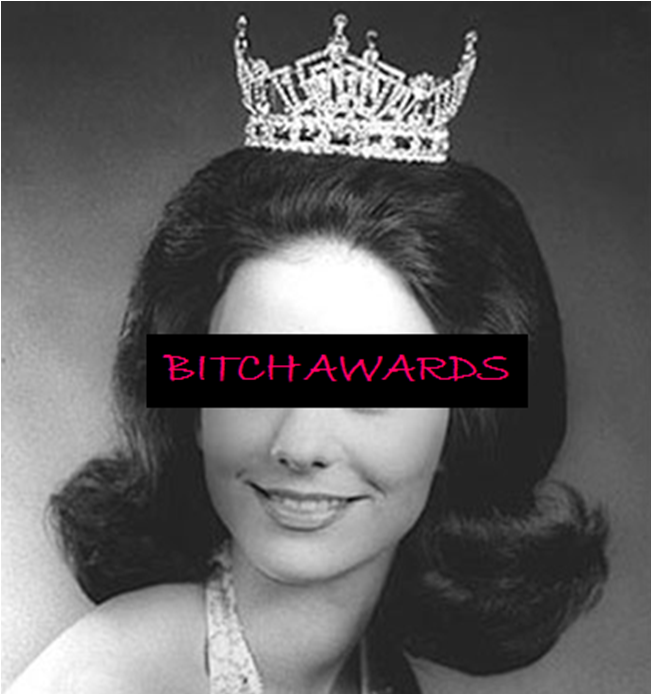 Welcome to the first annual Bitch Awards – the completely inconsequential end of year awards that celebrate 2011’s best – and worst – films and television shows. Stick around for the next two weeks as we raise a glass to our favourite films and television shows of the year and duck as we unceremoniously throw the remote at our least favourites.
Welcome to the first annual Bitch Awards – the completely inconsequential end of year awards that celebrate 2011’s best – and worst – films and television shows. Stick around for the next two weeks as we raise a glass to our favourite films and television shows of the year and duck as we unceremoniously throw the remote at our least favourites.
Today kicks off a week focusing on the peaks and the valleys of the film spectrum. Read on for our #5 picks for best of the best and worst of the worse.
Let’s begin by explaining the selection process for our film picks.
First off: You may see some 2010 titles on here. We considered any film that was released in 2011 eligible for a Bitch Award, so all of our picks debuted in theatres in Canada this past year. So that’s our excuse if any of our dedicated foreign readers spot a film that debuted earlier for them.
Secondly: We also readily admit that we have not seen all the films that were released in 2011. Our lists are comprised of films that we did see – but we will make mention of those that we really wanted to see, but for one reason or another, were unable to get to. (Gotta wait until our #1 picks order to keep the suspense going!)
Thirdly: We do dissect the films, so although most of the time there are mild to settle down levels of spoilers, if we’re going to blow the ending or a crucial scene, we will put up a SPOILER warning. Considered yourself warned for some mild reveals if you haven’t seen a film on the list.
Please bear in mind that our purpose here is not to be definitive; we simply want to encourage you to seek out some new films (and avoid others at all costs). And so, without further ado, we give you our top 5 best and worst films of the year! As always, please contribute your picks or disagree with us in the comments section below.
#5 WORST
TVangie: Source Code (Jones, 2011)
I’ll probably get some flack for this, but I really did not enjoy Source Code. I suppose it gets some marks for attempting to be ambitious by presenting a half-assed complex narrative. But let’s be honest, the non-linearity is played out in a pretty straightforward and pedestrian way. Within the first few minutes, we find out that solider Colder Stevens (Jake Gyllenhaal) is continually “transported” on to a commuter train in order to prevent a bombing. He is sent to observe, investigate and ultimately stop the bombing, reliving the experience multiple times in order to get it right. The catch is that he goes back with the knowledge of each previous visit. Confused? Yah, it takes about two passes to realize this exercise is just as redundant and tedious to the audience as it is for Stevens. Throw in a tacked-on romance between Stevens and Christina Warren (Michelle Monaghan) and the eye rolling just don’t stop.
But perhaps what launches this film into my top five worst list as opposed to the “meh” list, is its horrendous, overly sentimental ending. It is revealed that SPOILER ALERT (but I mean, really – I’m saving you from having to watch this…) Stevens is really a dead solider whose consciousness is being kept alive in some sort of cryogenic facility. This apparently explains how he’s able to jump into the future and therefore prevent the bombing before it happens. (I think. It’s so preposterous I think I pretty much had banished this film from my memory since I saw it this past summer and am drawing on fumes).
The film’s one saving grace is Vera Farmiga (to whom I say: “Run! You alone are the only good thing about this film!”). Farmiga plays Colleen Goodwin, who performs the predictable action of setting Stevens’ consciousness free at the end of the film, thereby nullifying the time traveling program altogether. We’re supposed to get the warm fuzzies because Stevens is able to live out his happily ever after with Christina in the afterlife of his subconscious. (UGH. Excuse me, I just threw up in my mouth a little…) We even get the hokey, sunshine-filled ending scene of the two walking hand it hand. Be free, Stevens. Be free. END SPOILERS
Source Code reminds me of one of those movies that throws in a little bit a of narrative twist, so that filmgoers can pat themselves on the back by understanding something that deviates slightly from the traditional cause and effect structure. You don’t want to be one of those people, do you? There are much better films out there. Don’t waste your time on this one.
Cinephilactic: Super 8 (Abrams, 2011)
Super 8 was one of my most anticipated films going into summer 2011. I like J.J. Abrams (I may be one of the few people who wasn’t driven away by Mission: Impossible 3 and I’m a huge fan of the television shows he helped create: Felicity, Alias, Fringe and, of course, Lost). I liked the idea of a new take on Stand By Me: examining how youth grow up and away from each other over time. And thanks to my interest in film I identified with the kids’ obsession with cinema as both a narrative and metaphorical device. Initially I was wary of the comparison to (and involvement of) Spielberg, with whom I have a bit of a love/hate relationship. I was willing to overlook all of this, however, due to advance reviews comparing Super 8 to The Goonies and E.T.
In truth, I don’t think that Super 8 is a bad film. I think that 50% of it is a great film. Anytime the film focuses on the children, their camaraderie over making a movie and hanging out, or their growing maturation such as Joe Lamb’s (Joel Courtney) rift from Charles (Riley Griffiths) over their mutual interest in Alice (Elle Fanning), the movie soars. It’s like a perfect glimpse into the awkward stage of adolescence when kids become teenagers and realize that life isn’t simple and black and white, or that they won’t always be friends. In these moments, the film is like a fly-on-the-wall documentary with winning performances by a group of child actors that perfectly spoke to me and filled me with nostalgia.
And then there’s the other 50% of the movie that features an alien, the evacuation of the town, and how conflict makes families come together and overcome substance abuse. Several aspects of the monster movie do work, but they’re never as interesting as the first film we’re presented with. It’s as though Abrams and mentor Spielberg don’t trust their audience to find enough in the story of the youths that they have to throw in all the extra science-fiction stuff (which doesn’t have to be bad if it were properly done). The issue is that the two films don’t speak to each other well, and the genuine performances that we associate with from the kids is increasingly forced to the fringes to make way for an alien invasion story. There’s nothing original in this part of the film, and SPOILERS the hypocrisy of the ending, in which the two fractured families of Joe and Alice come together to hold hands and stare at the sky is like a slap in the face of the audience. It reeks of the mandatory happy ending that studios hand down in notes to ensure that audiences leave feeling warm and fuzzy. And considering the genuine respect for both the performances and the characters we had at the start, the ending is just plain disingenuous and facile – which is something I never expected from someone like Abrams. END SPOILERS
Super 8 may not be the worst film of the year (that’s yet to come), but it does land on my top five list because it committed one of the worst cinematic sins of 2011: it let me down. That may seem petty, but I expect more from certain people, and Abrams is one of them.
#5 BEST
TVangie: Margin Call (Chandor, 2011)
I fully admit, I know absolutely nothing about the stock market or financial – anything. And yet, this film about a high profile investment bank (referred to ominously as “The Firm”) undergoing a financial crisis over a 24-hour period had me pretty much on the edge of my seat the entire time. Although not explicitly stated, it’s likely to draw source material from the financial crash of 2007-2008 and the aforementioned “Firm” could easily represent any of the major US banks.
Margin Call takes pains to explain complex financial jargon in layman’s terms (there are about a half a dozen explicit instances where execs asks analysts to ‘tell it to me straight/in English’) and I still found myself very much invested (pun intended) and engaged throughout despite my ignorance of the subject matter. I could attempt to give a plot summary here, but I think ultimately that would do the film a disservice. Let’s face it, stock markets and financial gibboty-gob is hardly the kind of material that sends you running to the theatre. But I can say in all honesty, I didn’t expect it but I was delighted with this film. The harmonious synergy between the actors, screenplay and direction make for a very gripping, solid film that is quite satisfying.
At face value, what carries Margin Call is the absolutely stellar performances from an all-star ensemble cast. But in order for these actors to shine as brightly as they do, a round of applause has to be given to J.C. Chandor who serves as both screenwriter and director. The dialogue is believable and compelling, all without alienating audience members who aren’t quite familiar with the jargon. Yes, the film primarily rests on a hand-held documentary-style to convey stark realism, which is predictable, but it works here. That simplicity really allows the actors to come to the forefront. Truly, the film doesn’t appear to have a weak performance in it, but Kevin Spacey, Stanley Tucci, Zachary Quinto, Paul Bettany and Jeremy (frickin) Irons need particular mention. I’ve never seen a better example of actors bringing out the best in each other and boy, it sure is delicious to watch.
I never (ever) thought I would be recommending a stock-market-y film, much less put one on my best list, but this one is definitely worth a check out if you want to see what some amazing actors can do with a well-written, perfectly paced script, guided by a talented director.
Cinephilactic: Scream 4 (Craven, 2011)
This is a very personal pick because the Scream franchise and I have a long and sordid history. Back in high school I bought the original Scream on VHS and watched it until the tape broke…one month later (my sister and I estimate we watched it every day). I’m the weird loser who thinks that the sequel, Scream 2, is better than the original and it remains my favourite sequel of all time. Scream 3 was a colossal disappointment (I blame writer Ehren Kruger who replaced franchise originator Kevin Williamson). And then the long wait for Scream 4 built up my anticipation.
Scream 4 is not a perfect film. Characters do and say stupid things, and several of them disappear for so long that you almost forget they’re still alive. I’m still unsure why Mary McDonnell and Marley Shelton are even in it, I think Nico Tortorella (as the main heartthrob) is as shallow as his one-dimensional characterization and the post-climax climax (in the denouement) is unwelcome and reminiscent of the horrible Black Christmas (Morgan, 2006) hospital finale.
So why is this film my top 5 pick for the year?! Simple: because it’s a helluva lot of fun. The opening is a metatextual mind-frak and packs a huge number of cameos from Hollywood’s up and coming starlet pool. Beyond that, Hayden Panettiere’s (whom I’m normally not a fan of) Rory is a fantastic addition to the Scream crew and it’s great to see Sidney (Neve Campbell), Dewey (David Arquette) and Gale (Courtney Cox) interact again after so long. The gore is over the top, the pacing brisk, and the jokes are more self-referential and apropos than ever. The true beauty of the film, however, is how it rewards its fanbase: having mini-marathoned the original trilogy in anticipation of the new installment, I was shocked at how much detail went into the fourth film in reference to the original films. Scream 4 may not be the best film (or even the best horror film) of the year, but for the nostalgic film viewer who lived on Scream in the mid-to-late 90s, this was a more than welcome return to form for a franchise than defined a generation and revitalized a genre.
—
What do you think of our “fifth” picks? Sound off in the comments!
Be sure to tune in tomorrow for the reveal of our number four picks. And remember to come back through the remainder of the year for the rest of our film and television best/worst picks.
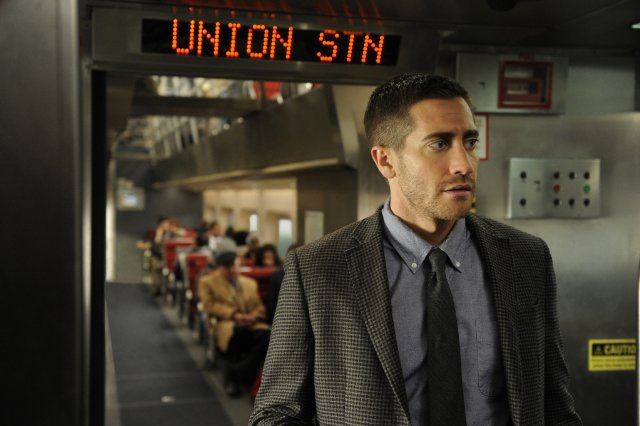
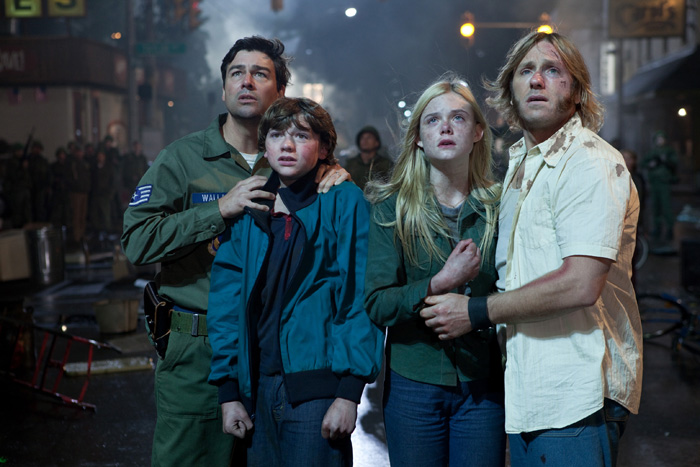
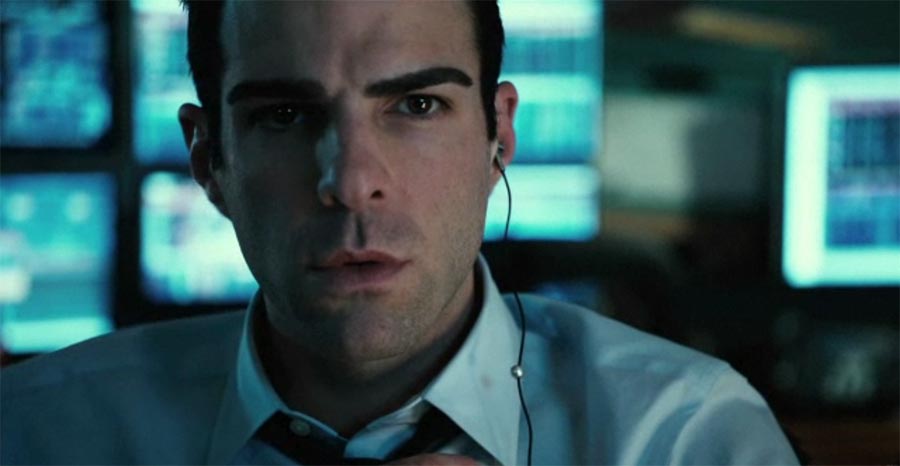
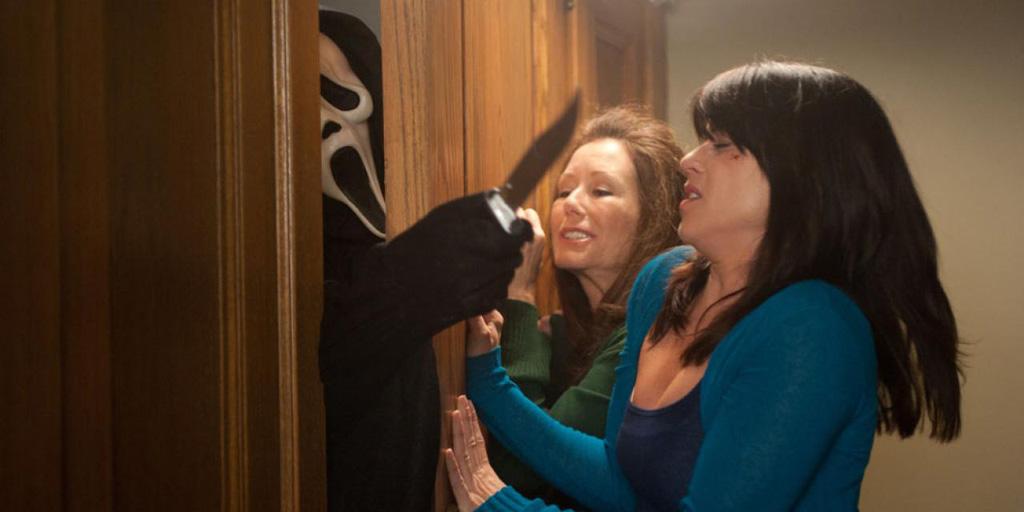
I have not seen Margin Call, but I agree (somewhat) with Source Code. Yes it tried to be complex in the narrative, but it’s a sci-fi, it over explained EVERYTHING. Think Inception, it did not ask for a long, deep explanation of how everything works, Source Code did not need it either.
I’ll have to see Margin Call now! I’m too scared to watch a horror movie… Looking forward to the countdown. Keep ’em coming.
I completely agree about Margin Call- of course, I love Quinto in anything, but it was still a rocking movie. And I didn’t think Super 8 was *that* bad, but you do have a point. Pretty good choices.
cool . The margin call made # 5 , love you Zachary Quinto